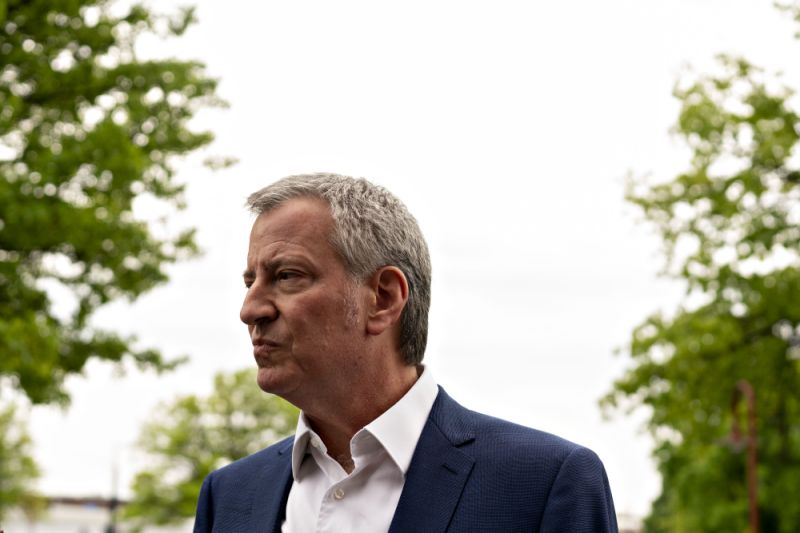

(Bloomberg) — New York Mayor Bill de Blasio embarked on his long shot presidential campaign, venturing into some of the most sparsely populated parts of Iowa, and unlike the skepticism he’s received from his home town, voters seemed eager to hear him out and were respectful of his accomplishments as the leader of the most populous U.S. city.
Rupert Murdoch’s New York Post ran a front page composite photo of people laughing and munching popcorn in reaction to his candidacy, depicting him as a circus clown, and Fox News commentator Tucker Carlson recalled de Blasio’s awkward lost grip on a woodchuck who later died after Groundhog Day in 2014, asking, “Are we ready to put America in his hands?”
The critics also include some of his past political allies, including state Attorney General Letitia James, who served with de Blasio in the City Council and described him as a friend while also saying “we need a mayor who is going to be on the job 24 hours a day.” Former political consultants who helped him achieve two overwhelming mayoral election victories aren’t working for him on this campaign.
De Blasio’s chances at overcoming his underdog status might be better if he had ignited more enthusiasm among New Yorkers. An April 3 Quinnipiac University poll found that 76% of city voters said he should not run. His negative job approval rating — 42% to 44% — doesn’t help, although he’s popular among 66% of the city’s black voters.
“It’s sure to come up,” said Iowa Democratic Chairman Troy Price, when asked about the negative reaction to de Blasio’s candidacy among some New Yorkers. “But people here try to keep an open mind, particularly in the early stages.”
Part of the quadrennial political ritual that Iowa experiences through its statewide caucus system is built upon a widespread belief that everyone who has stepped into this arena deserves an opportunity to be heard, said political scientist Arthur Sanders, who teaches at Drake University in Des Moines.
“Iowans take this process very seriously,” Sanders added. “We know that with so many candidates, Iowa and New Hampshire become crucial in narrowing the field and selecting the nominee. De Blasio’s strengths? He’s the mayor of the largest city in the United States, he’s got some accomplishments on crime, education and jobs, and when you have 20-plus candidates, it helps to have the attention of the New York media, even if a lot of the publicity is negative.”
Presidential Race
De Blasio this week became the 23rd Democrat to join the race for the party’s presidential nomination, putting him behind most other candidates in raising money and building a campaign organization. There are more than a dozen candidates, including fellow New Yorker Senator Kirsten Gillibrand, struggling to draw more than 1% in polls, well behind the two front-runners, former Vice President Joe Biden and Vermont Senator Bernie Sanders.
Iowa’s caucuses next February mark the start of the nomination contest, and voters in the state expect to evaluate candidates in person.
De Blasio’s double-barreled campaign strategy is to depict himself as the candidate most able to fight toe-to-toe with President Donald Trump, and by decrying income inequality and corporate greed, themes that have worked for him since he was first elected to New York’s City Council in 2001.
He’s already had success, drawing Trump into a Twitter and YouTube battle of insults, and landing a punch by copying Trump’s tactic of giving his opponent a derisive nickname, in this case the moniker “Con Don.”
Rural Economy
“He told working people in Iowa in rural areas he was going to be on their side and he socked them with tariffs that are destroying the rural economy,” de Blasio said Friday in a scrum with reporters. “He told working people he was going to do all sorts of things to put money in their pocket and he put money in the pockets only of wealthy people and corporations. He’s a con man, that’s why I call him Con Don.”
De Blasio pressed the attack on Trump by making his first stop an ethanol plant in Gowrie, a town of about 1,000. The sprawling facility that towers over the prairie landscape employs 46 people and is designed to produce 69 million gallons of ethanol from about 24 million bushels of locally-grown corn a year.
“Time and again when there was an opportunity to help the biofuels industry to grow and create jobs in places like rural Iowa the Trump administration has favored big petroleum companies,” de Blasio told reporters. “I want to see a lot more farming communities to have these biofuel facilities. That’s not going to happen if the federal government keeps favoring the big petroleum industry.’’
Ethanol Rules
The Trump administration’s waivers to let oil companies avoid requirements to use ethanol in fuel mixtures has created some tension with one of the president’s core constituencies: corn-belt farmers. Combined with tariff policies that have reduced exports of corn, soybeans and pork to China, the relaxation of ethanol minimums have hit farmers in Iowa particularly hard, making mounds of unsold corn piling up on rural roadsides a familiar sight.
He also was welcomed into the home of George Naylor, 71, who with his wife Patti, gathered 10 farmers among Gowrie’s residents, and found in the mayor a sympathetic listener to the problems faced by family farmers at a time when Trump’s trade war with China has cut into local production and sales of corn, soybeans and pork.
Naylor, a graduate of the University of California at Berkeley, said he’s undecided about whom to support after backing Sanders four years ago.
“I’m very impressed with his knowledge of the economy and his conviction that some big things need to change,’’ said Naylor, who’s farmed his family property for 42 years. “He is very concerned about working people, income inequality and the farm policy that we have.”
Gowrie and Gracie
When reporters asked de Blasio what he could possibly have in common with Iowa’s rural voters, he was ready with an answer.
“It’s all about working people,” he said. “It doesn’t matter if you’re in Gowrie, Iowa, or New York City. In the end people should trust someone who has actually done something for working people.”
Reporters also asked how he was paying for the trip, and whether it was appropriate for him to use Gracie Mansion, the mayor’s official residence in part of the video he made to announce his candidacy.
“It’s the sixth year of my mayoralty, we’ve put a whole host of plans in place,” he said, adding that he’ll disclose his fundraising and expenses when he files campaign finance reports. “Does anyone want to talk about the issues facing the people of Iowa?”
To contact the reporter on this story: Henry Goldman in New York at [email protected]
To contact the editors responsible for this story: Flynn McRoberts at [email protected], Joe Sobczyk, John Harney
<p class="canvas-atom canvas-text Mb(1.0em) Mb(0)–sm Mt(0.8em)–sm" type="text" content="For more articles like this, please visit us at bloomberg.com” data-reactid=”54″>For more articles like this, please visit us at bloomberg.com
©2019 Bloomberg L.P.









